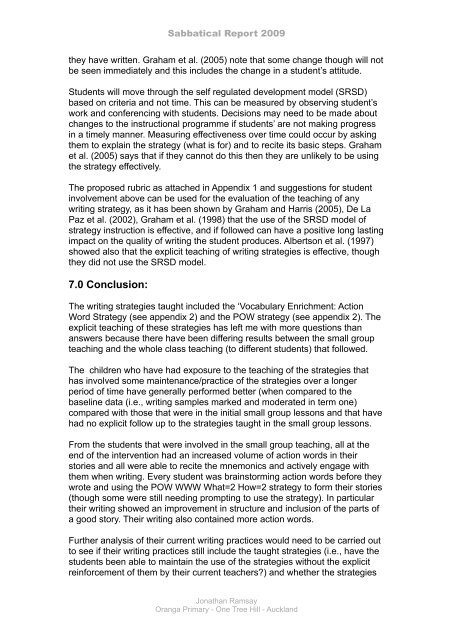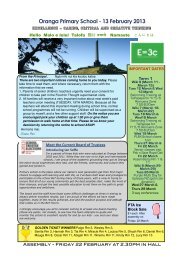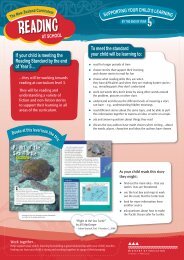Sabbatical Report - Oranga School Website
Sabbatical Report - Oranga School Website
Sabbatical Report - Oranga School Website
You also want an ePaper? Increase the reach of your titles
YUMPU automatically turns print PDFs into web optimized ePapers that Google loves.
<strong>Sabbatical</strong> <strong>Report</strong> 2009<br />
they have written. Graham et al. (2005) note that some change though will not<br />
be seen immediately and this includes the change in a student’s attitude.<br />
Students will move through the self regulated development model (SRSD)<br />
based on criteria and not time. This can be measured by observing student’s<br />
work and conferencing with students. Decisions may need to be made about<br />
changes to the instructional programme if students’ are not making progress<br />
in a timely manner. Measuring effectiveness over time could occur by asking<br />
them to explain the strategy (what is for) and to recite its basic steps. Graham<br />
et al. (2005) says that if they cannot do this then they are unlikely to be using<br />
the strategy effectively.<br />
The proposed rubric as attached in Appendix 1 and suggestions for student<br />
involvement above can be used for the evaluation of the teaching of any<br />
writing strategy, as it has been shown by Graham and Harris (2005), De La<br />
Paz et al. (2002), Graham et al. (1998) that the use of the SRSD model of<br />
strategy instruction is effective, and if followed can have a positive long lasting<br />
impact on the quality of writing the student produces. Albertson et al. (1997)<br />
showed also that the explicit teaching of writing strategies is effective, though<br />
they did not use the SRSD model.<br />
7.0 Conclusion:<br />
The writing strategies taught included the ‘Vocabulary Enrichment: Action<br />
Word Strategy (see appendix 2) and the POW strategy (see appendix 2). The<br />
explicit teaching of these strategies has left me with more questions than<br />
answers because there have been differing results between the small group<br />
teaching and the whole class teaching (to different students) that followed.<br />
The children who have had exposure to the teaching of the strategies that<br />
has involved some maintenance/practice of the strategies over a longer<br />
period of time have generally performed better (when compared to the<br />
baseline data (i.e., writing samples marked and moderated in term one)<br />
compared with those that were in the initial small group lessons and that have<br />
had no explicit follow up to the strategies taught in the small group lessons.<br />
From the students that were involved in the small group teaching, all at the<br />
end of the intervention had an increased volume of action words in their<br />
stories and all were able to recite the mnemonics and actively engage with<br />
them when writing. Every student was brainstorming action words before they<br />
wrote and using the POW WWW What=2 How=2 strategy to form their stories<br />
(though some were still needing prompting to use the strategy). In particular<br />
their writing showed an improvement in structure and inclusion of the parts of<br />
a good story. Their writing also contained more action words.<br />
Further analysis of their current writing practices would need to be carried out<br />
to see if their writing practices still include the taught strategies (i.e., have the<br />
students been able to maintain the use of the strategies without the explicit<br />
reinforcement of them by their current teachers?) and whether the strategies<br />
Jonathan Ramsay<br />
<strong>Oranga</strong> Primary - One Tree Hill - Auckland




